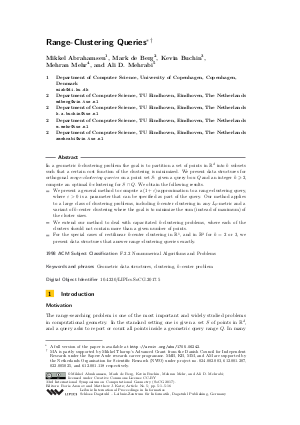Range-Clustering Queries
Authors Mikkel Abrahamsen, Mark de Berg, Kevin Buchin, Mehran Mehr, Ali D. Mehrabi
-
Part of:
Volume:
33rd International Symposium on Computational Geometry (SoCG 2017)
Part of: Series: Leibniz International Proceedings in Informatics (LIPIcs)
Part of: Conference: Symposium on Computational Geometry (SoCG) - License:
 Creative Commons Attribution 3.0 Unported license
Creative Commons Attribution 3.0 Unported license
- Publication Date: 2017-06-20
File

PDF
LIPIcs.SoCG.2017.5.pdf
- Filesize: 0.6 MB
- 16 pages
Document Identifiers
Subject Classification
Keywords
- Geometric data structures
- clustering
- k-center problem
Metrics
- Access Statistics
-
Total Accesses (updated on a weekly basis)
0Document
0Metadata
Abstract
In a geometric k-clustering problem the goal is to partition a set of points in R^d into k subsets such that a certain cost function of the clustering is minimized. We present data structures for orthogonal range-clustering queries on a point set S: given a query box Q and an integer k > 2, compute an optimal k-clustering for the subset of S inside Q. We obtain the following results. * We present a general method to compute a (1+epsilon)-approximation to a range-clustering query, where epsilon>0 is a parameter that can be specified as part of the query. Our method applies to a large class of clustering problems, including k-center clustering in any Lp-metric and a variant of k-center clustering where the goal is to minimize the sum (instead of maximum) of the cluster sizes. * We extend our method to deal with capacitated k-clustering problems, where each of the clusters should not contain more than a given number of points. * For the special cases of rectilinear k-center clustering in R^1, and in R^2 for k = 2 or 3, we present data structures that answer range-clustering queries exactly.
Cite As Get BibTex
Mikkel Abrahamsen, Mark de Berg, Kevin Buchin, Mehran Mehr, and Ali D. Mehrabi. Range-Clustering Queries. In 33rd International Symposium on Computational Geometry (SoCG 2017). Leibniz International Proceedings in Informatics (LIPIcs), Volume 77, pp. 5:1-5:16, Schloss Dagstuhl – Leibniz-Zentrum für Informatik (2017)
https://doi.org/10.4230/LIPIcs.SoCG.2017.5
BibTex
@InProceedings{abrahamsen_et_al:LIPIcs.SoCG.2017.5,
author = {Abrahamsen, Mikkel and de Berg, Mark and Buchin, Kevin and Mehr, Mehran and Mehrabi, Ali D.},
title = {{Range-Clustering Queries}},
booktitle = {33rd International Symposium on Computational Geometry (SoCG 2017)},
pages = {5:1--5:16},
series = {Leibniz International Proceedings in Informatics (LIPIcs)},
ISBN = {978-3-95977-038-5},
ISSN = {1868-8969},
year = {2017},
volume = {77},
editor = {Aronov, Boris and Katz, Matthew J.},
publisher = {Schloss Dagstuhl -- Leibniz-Zentrum f{\"u}r Informatik},
address = {Dagstuhl, Germany},
URL = {https://drops.dagstuhl.de/entities/document/10.4230/LIPIcs.SoCG.2017.5},
URN = {urn:nbn:de:0030-drops-72147},
doi = {10.4230/LIPIcs.SoCG.2017.5},
annote = {Keywords: Geometric data structures, clustering, k-center problem}
}
Author Details
References
-
M. Abam, P. Carmi, M. Farshi, and M. Smid. On the power of the semi-separated pair decomposition. Compututational Geometry: Theory and Applications, 46:631-639, 2013.

-
P. K. Agarwal, R. Ben Avraham, and M. Sharir. The 2-center problem in three dimensions. Compututational Geometry: Theory and Applications, 46:734-746, 2013.

-
P. K. Agarwal and Cecilia M. Procopiuc. Exact and approximation algorithms for clustering. Algorithmica, 33:201-226, 2002.

-
Sunil Arya, David M. Mount, and Eunhui Park. Approximate geometric MST range queries. In Proc. 36th International Symposium on Computational Geometry (SoCG), pages 781-795, 2015.

-
Peter Brass, Christian Knauer, Chan-Su Shin, Michiel H. M. Smid, and Ivo Vigan. Range-aggregate queries for geometric extent problems. In Computing: The Australasian Theory Symposium 2013, CATS'13, pages 3-10, 2013.

-
V. Capoyleas, G. Rote, and G. Woeginger. Geometric clusterings. Journal of Algorithms, 12:341-356, 1991.

-
T. M. Chan. Geometric applications of a randomized optimization technique. Discrete &Compututational Geometry, 22:547-567, 1999.

-
T. M. Chan. More planar two-center algorithms. Compututational Geometry: Theory and Applications, 13:189-198, 1999.

-
Bernard Chazelle. A functional approach to data structures and its use in multidimensional searching. SIAM Journal on Computing, 17:427-462, 1988.

-
A. W. Das, P. Gupta, K. Kothapalli, and K. Srinathan. On reporting the L₁-metric closest pair in a query rectangle. Information Processing Letters, 114:256-263, 2014.

-
Mark de Berg, Marc van Kreveld, and Jack Snoeyink. Two- and three-dimensional point location in rectangular subdivisions. Journal of Algorithms, 18:256-277, 1995.

-
D. Eppstein. Faster construction of planar two-centers. In Proc. 8th Annual ACM-SIAM Symposiun on Discrete Algorithms (SODA), pages 131-138, 1997.

-
P. Gupta, R. Janardan, Y. Kumar, and M. Smid. Data structures for range-aggregate extent queries. Compututational Geometry: Theory and Applications, 47:329-347, 2014.

-
Sariel Har-Peled. Geometric Approximation Algorithms, volume 173 of Mathematical surveys and monographs. American Mathematical Society, 2011.

-
Sariel Har-Peled and Soham Mazumdar. On coresets for k-means and k-median clustering. In Proc. 36th Annual ACM Symposium on Theory of Computing (STOC), pages 291-300, 2004.

-
M. Hoffmann. A simple linear algorithm for computing rectilinear 3-centers. Compututational Geometry: Theory and Applications, 31:150-165, 2005.

-
R. Z. Hwang, R. Lee, and R. C. Chang. The generalized searching over separators strategy to solve some NP-hard problems in subexponential time. Algorithmica, 9:398-423, 1993.

-
S. Khare, J. Agarwal, N. Moidu, and K. Srinathan. Improved bounds for smallest enclosing disk range queries. In Proc. 26th Canadian Conference on Computational Geometry (CCCG), 2014.

-
H.-P. Lenhof and M. H. M. Smid. Using persistent data structures for adding range restrictions to searching problems. Theoretical Informatics and Applications, 28:25-49, 1994.

-
Yakov Nekrich and Michiel H. M. Smid. Approximating range-aggregate queries using coresets. In Proc. 22nd Canadian Conference on Computational Geometry (CCCG), pages 253-256, 2010.

-
Jeff M. Phillips. Algorithms for ε-approximations of terrains. In Proc. 35th International Colloquium on Automata, Languages, and Programming (ICALP), pages 447-458, 2008.

-
M. Sharir. A near-linear time algorithm for the planar 2-center problem. Discrete &Compututational Geometry, 18:125-134, 1997.

-
M. Sharir and E. Welzl. Rectilinear and polygonal p-piercing and p-center problems. In Proc. 12th International Symposium on Computational Geometry (SoCG), pages 122-132, 1996.

-
Gelin Zhou. Two-dimensional range successor in optimal time and almost linear space. Information Processing Letters, 116:171-174, 2016.

